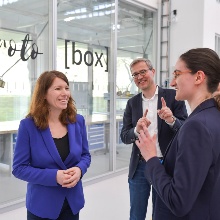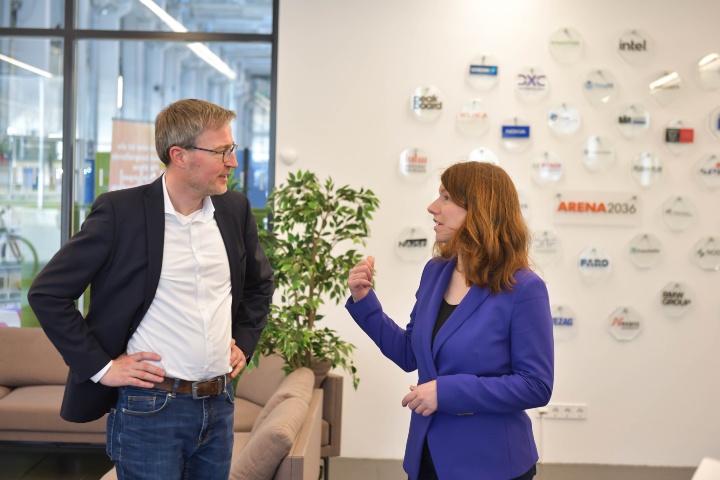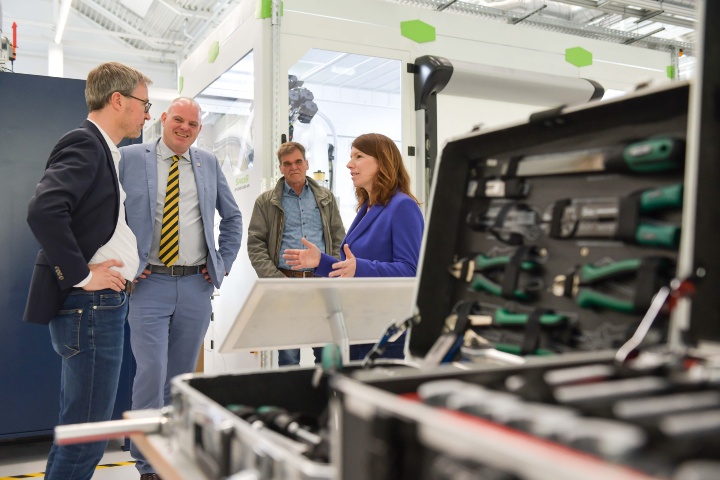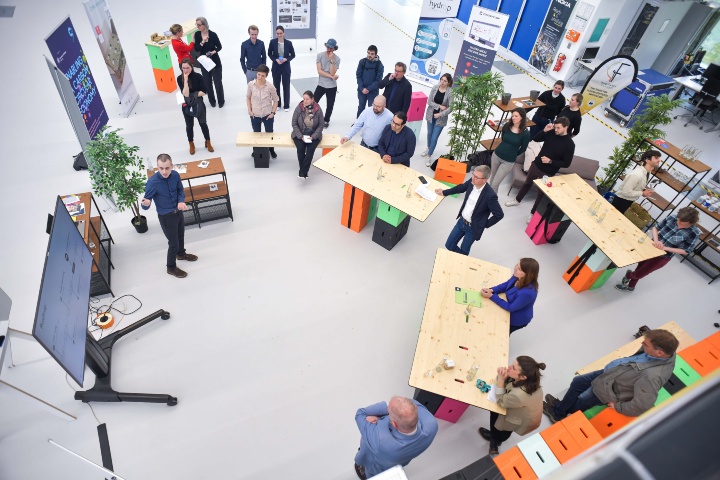"This could be a game-changer for Germany", said Maike Lambarth as she presented her Deep tech start-up Cyclize at Startup Campus 0711 during the visit by Dr. Anna Christmann, MdB. Her innovation: A plasma technology that transforms plastic waste into new chemical intermediates, thereby uncoupling the chemical industry from the need for fossil carbon.
Spin-offs and new companies established at universities have what it takes to solve pressing social challenges, transform entire sectors of the economy and develop completely new business models. Universities facilitate the entire process, from the initial idea to founding a start-up by offering targeted support services ranging from entrepreneurship teaching, business coaching and IP consulting to assistance with funding applications. Since 2020, the Hochschule der Medien (HdM) and the University of Stuttgart have been bundling support offers for entrepreneurs at the "Startup Campus 0711".
Anna Christmann, Member of the Bundestag for the Stuttgart II constituency and delegate for the Federal Ministry of Economics and Climate Protection for the Digital Economy and Start-Ups, visited the campus in Vaihingen to find out how the project is progressing.
Prof. Peter Middendorf, Vice Rector for Knowledge and Technology Transfer at the University of Stuttgart and Prof. Nils Högsdal, Vice Rector for Innovation Management from the HdM, welcomed Dr. Anna Christmann to ARENA2036. After a tour of the research campus and a visit to the Makerspace, Johanna Kutter (HdM) introduced the concept of the Startup Campus 0711, its current projects and what projects are planned until the project is due to end at the beginning of 2024.
A network is better - this is the founding idea behind Startup Campus 0711. This approach enables the universities to bundle and pool their areas of expertise, open up offerings to students from other universities in the hub, and work closely together in the search for investors. As awareness of Startup Campus 0711 increases, so does demand. In 2022 alone, the campus conducted more than 300 initial consultations, formally established 47 companies, and raised funding of 1.94 million euros.
In addition to the regional expansion of the Startup Campus 0711 to include other universities in the Stuttgart region, specific focus groups and topics also promise to release additional startup potential. According to Johanna Kutter, there is still much more to be done and a lot more untapped potential in terms of impact entrepreneurship, female founders and migrant entrepreneurs, and she hinted at collaborations that are already underway at the Stuttgart University Hub.
Problem areas that limit startup activity were also addressed: In addition to the issue of funding, it is the search for co-founders in particular that pulls the plug on many startups in the early stages. "We see great potential here for the development of Startup Campus 0711, from a project at Campus Vaihingen campus to a project at other universities in the Stuttgart region," says Peter Middendorf. "Bringing together suitable founders across universities who complement each other in terms of their areas of expertise and interests can further stimulate the start-up culture in our country," added Nils Högsdal.
Six start-ups present their innovations
"It's important that we are able to continue what we've built up over the last few years, even after the project ends," emphasized Middendorf. Further funding from the federal government is required to realize this aim.
Anna Christmann believes that companies based in the region have a particular responsibility to ensure the continuity of support services at universities.
Startup Campus 0711 took advantage of Christmann's visit to put on a show at the Design Factory Stuttgart space. Six start-ups presented their innovations, the current status of their start-ups and also highlighted the challenges ahead. All six start-ups have received start-up or research transfer funding from the BMWK's EXIST funding program.
Nils Bachmann from the start-up Proservation showed how grain husks can be turned into bio-based, environmentally friendly packaging material. Proservation has now opened its first production premises in Stuttgart-Cannstatt. The start-up benefited from special conditions granted by the city of Stuttgart for renting vacant buildings.
Dr. Ines Würth from enviconnect explained how her start-up aims to improve the development and operation of wind farms with high-performance software. She vividly described what it means to have a good idea but no programmer to implement it, and the importance of supportive guidance when launching a startup.
Dr. Pascal Kraft presented the platform-based start-up Cosonify, which supports musicians in the collaborative development of songs. He emphasized the importance of being able to find the right people at the right time. It was only when he was randomly matched with another founder that it became possible to transform the thought that "this could be a great idea" into a veritable, business-ready start-up.
With her start-up hydrop water systems, Katrin Kreidel aims to make people aware of their own personal water consumption. The AI-supported tool analyzes water consumption, records how much water is used for specific tasks, and aims to encourage behavioral changes and decrease consumption via app-based feedback. She also offered to equip the Bundestag with hydrop meters. Katrin Kreidel described how an EXIST start-up grant is great, but that twelve months is too short when a startup suddenly has to deal with the collapse of global supply chains.
Maike Lambarth of Cyclize pointed out that disruptive deep tech start-ups usually have longer development times before demonstrators or even market-ready products emerge. Although EXIST research transfer funding gives her start-up more time than the EXIST start-up grant, she says follow-up financing is already an issue.
Dr. Claudiu Mortan and Prof. Michael Saliba stated that for their start-up Perosol, an investment of 60 million euros would be required to give their innovation - printed, flexible perovskite solar cells - the backing it requires. The team is the first in Germany to develop such a printing process and is among the top five comapnies using perovskite: Another game changer made in Stuttgart.





